Donati Surname Ancestry ResultsOur indexes 1000-1999 include entries for the spelling 'donati'. In the period you have requested, we have the following 10 records (displaying 1 to 10): Buy all | | | Get all 10 records to view, to save and print for £46.00 |
These sample scans are from the original record. You will get scans of the full pages or articles where the surname you searched for has been found. Your web browser may prevent the sample windows from opening; in this case please change your browser settings to allow pop-up windows from this site. Close Rolls
(1333-1337)
The close rolls of the 7th to 10th years of the reign of king Edward III, that is from 25 January 1333 to 24 January 1337, record the main artery of government administration in England, the orders sent out day by day to individual officers, especially sheriffs of shires: they are an exceptionally rich source for so early a period. In amongst this official material, the rolls were also used as a way of recording many acknowledgments of private debts and contracts between individuals. Most of the contents relate to England, but there are also entries concerning Wales, Scotland, Ireland and the English possessions in France: particularly Scotland, where the king was campaigning during this period. This calendar was prepared by A. B. Hinds of the Public Record Office and published in 1898.DONATI. Cost: £4.00.  | Sample scan, click to enlarge

| The English in France
(1442)
King Henry VI of England (one of the grandsons of Charles VI of France) claimed the throne of France (and quartered the fleurs-de-lis of France with the lions of England on the royal standard) as had his predecessors since Edward III, as descendants of Philip IV of France. The English had real power or influence in Brittany, Normandy, Flanders and Gascony, and actual possession of several coastal garrisons, in particular Calais, where the French inhabitants had been replaced by English. Henry VI came to the throne only seven years after his father had trounced the French at Agincourt; but his cousin, Charles VII, who became king of France in the same year, spent his long reign rebutting the English king's claim to his throne by territorial reconquest and consolidation. The English administration kept a series of records called the French Rolls. On these are recorded royal appointments and commissions in France; letters of protection and safe-conduct to soldiers, merchants, diplomats and pilgrims travelling to France from England and returning, and to foreign legations. There are also licences to merchants to export to the Continent, and to captains to transport pilgrims. As Henry VI's reign progressed, and the English grip on northern France loosened, the French Rolls also increasingly include entries concerning the ransoming of English prisoners.DONATI. Cost: £6.00.  | Sample scan, click to enlarge
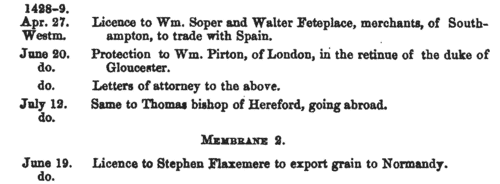
| The English in France
(1446)
King Henry VI of England (one of the grandsons of Charles VI of France) claimed the throne of France (and quartered the fleurs-de-lis of France with the lions of England on the royal standard) as had his predecessors since Edward III, as descendants of Philip IV of France. The English had real power or influence in Brittany, Normandy, Flanders and Gascony, and actual possession of several coastal garrisons, in particular Calais, where the French inhabitants had been replaced by English. Henry VI came to the throne only seven years after his father had trounced the French at Agincourt; but his cousin, Charles VII, who became king of France in the same year, spent his long reign rebutting the English king's claim to his throne by territorial reconquest and consolidation. The English administration kept a series of records called the French Rolls. On these are recorded royal appointments and commissions in France; letters of protection and safe-conduct to soldiers, merchants, diplomats and pilgrims travelling to France from England and returning, and to foreign legations. There are also licences to merchants to export to the Continent, and to captains to transport pilgrims. As Henry VI's reign progressed, and the English grip on northern France loosened, the French Rolls also increasingly include entries concerning the ransoming of English prisoners.DONATI. Cost: £6.00.  | Sample scan, click to enlarge
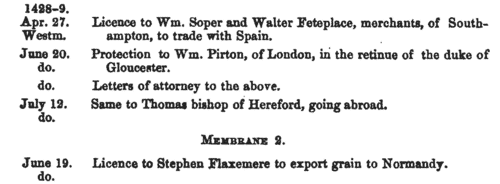
| The English in France
(1460)
King Henry VI of England (one of the grandsons of Charles VI of France) claimed the throne of France (and quartered the fleurs-de-lis of France with the lions of England on the royal standard) as had his predecessors since Edward III, as descendants of Philip IV of France. The English had real power or influence in Brittany, Normandy, Flanders and Gascony, and actual possession of several coastal garrisons, in particular Calais, where the French inhabitants had been replaced by English. Henry VI came to the throne only seven years after his father had trounced the French at Agincourt; but his cousin, Charles VII, who became king of France in the same year, spent his long reign rebutting the English king's claim to his throne by territorial reconquest and consolidation. The English administration kept a series of records called the French Rolls. On these are recorded royal appointments and commissions in France; letters of protection and safe-conduct to soldiers, merchants, diplomats and pilgrims travelling to France from England and returning, and to foreign legations. There are also licences to merchants to export to the Continent, and to captains to transport pilgrims. As Henry VI's reign progressed, and the English grip on northern France loosened, the French Rolls also increasingly include entries concerning the ransoming of English prisoners.DONATI. Cost: £6.00.  | Sample scan, click to enlarge
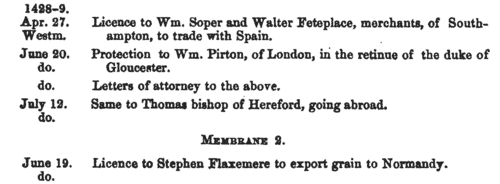
| London and Middlesex Feet of Fines
(1198-1485)
Pedes Finium - law suits, or pretended suits, putting on record the ownership of land in London and Middlesex.DONATI. Cost: £4.00.  | Sample scan, click to enlarge

| Naturalizations
(1903)
The Home Office issued monthly lists of aliens to whom Certificates of Naturalization or Readmission to British Nationality had been granted by the Secretary of State under the provisions of 33 Vic. cap. 14 and been registered in the Home Office pursuant to the act during each previous month. These notices, from January to December 1903, refer to naturalizations from December 1902 to November 1903.DONATI. Cost: £4.00.  | Sample scan, click to enlarge

| Naturalizations
(1927)
The Home Office issued monthly lists of aliens to whom Certificates of Naturalization had been granted by the Secretary of State and whose oaths of allegiance had been registered in the Home Office. These notices, from January to December 1927, refer to naturalizations from December 1926 to November 1927. The lists give full name (surname first) with any aliases; country of origin; occupation; full postal address; date of taking the oath. An asterisk indicates re-admission to British nationality.DONATI. Cost: £4.00.  | Sample scan, click to enlarge
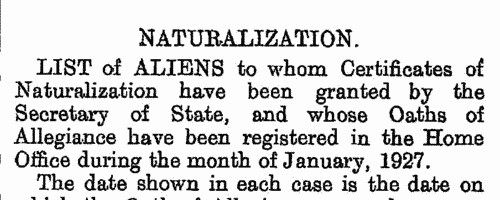
| Members of Cambridge University
(1935)
The Cambridge University Calendar for 1935-1936 includes this list of all living members of the university, i. e. not only undergraduates and members of staff, but also all surviving graduates from earlier generations. The names are arranged alphabetically by surname, then by college in order of foundation, and under the particular colleges by order of seniority of the B. A. degree. Surnames are given, initials, name of college, and then the years of graduating B. A. and M. A. Where a change of name had occurred since matriculation, the original name is inserted in brackets. For undergraduates the term of matriculation is given in square brackets with an M for Michaelmas, L for Lent or E for Easter. An asterisk before a surname indicates a member of the Senate. Names which appeared on the roll of the Regent House promulgated in November 1934 are marked with a dagger. Further degrees, such as PHD, MB, BCHIR, MD, &c. are listed in smaller capitals with the year conferred.DONATI. Cost: £4.00.  | Sample scan, click to enlarge
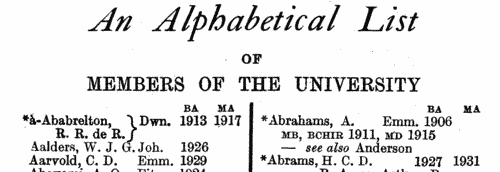
| Naval Officers
(1939)
The alphabetical list of officers on the Active List of the Royal Navy and Royal Marines (RM) gives: where serving; name (surname and initials); rank; and the dates of their seniority. This is the list from the March 1939 edition of the Navy List, corrected to 18 February 1939.DONATI. Cost: £4.00.  | Sample scan, click to enlarge

| Residents of Gloucester
(1955)
Kelly's Directory of the City of Gloucester and District included this section listing private residents, with postal addresses and telephone numbers. The area covered is the city and immediate suburbs, but not the villages in the neighbouring countryside.DONATI. Cost: £4.00.  | Sample scan, click to enlarge
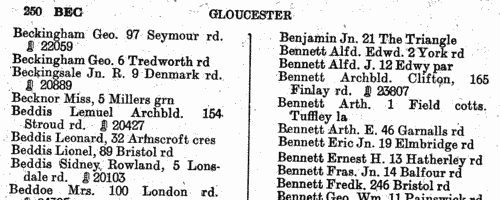
|
Research your ancestry, family history, genealogy and one-name study by direct access to original records and archives indexed by surname.
|












